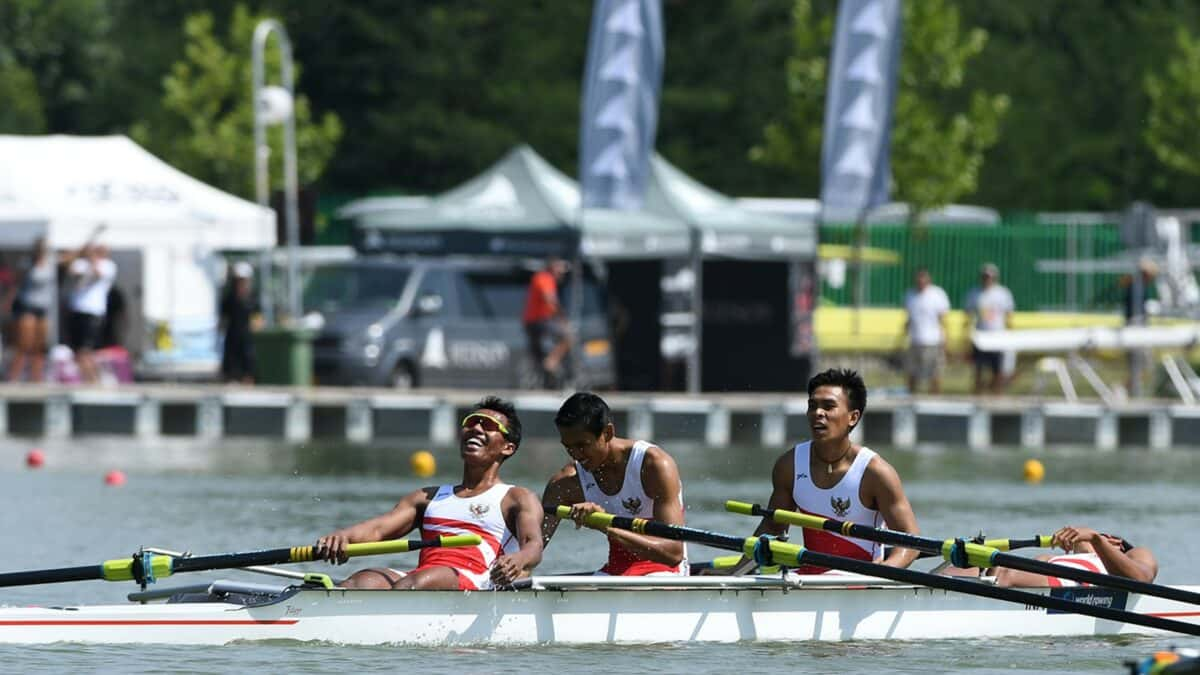
27 Aug 2018
Indonesian rowers place well in home-country Asian Games
Host country Indonesia achieved their best-ever Asian Games performance, taking a total of five medals. They also brought a spectacular ending to the regatta by winning their first-ever gold medal in the last race of the day – the final of the lightweight men’s eights. The Indonesian crew moved into the lead after trailing Uzbekistan for the first 500m. Indonesia then moved steadily away, leaving Uzbekistan to take silver and Hong Kong to snatch the bronze from India in the final sprint. There were tears in the eyes of many local spectators as the Indonesian anthem played at the final medal ceremony.
Another historical moment came in the final of the lightweight women’s quadruple sculls with Vietnam taking the gold medal ahead of Iran and Indonesia. This was not only the first Asian Games gold medal won in rowing, but the first for Vietnam in any sport at the Asian Games. Huge credit to the crew of Thi Thao Luong, Thi Ly Ho, Thanh Huyen Ta and Thi Thao Pham, and their coaching team led by Australian Jo Donnelly who overcame many challenges to accomplish this. Vietnam also won a silver medal in the women’s four.
China dominated the medal table, winning a total of nine golds and one silver medal. They were followed by Korea, Indonesia and Uzbekistan as the top performers, with 12 Federations winning medals in all. The Chinese crews were especially strong in the single sculls with Olympian and 2010 World Championship finalist Liang Zhang taking gold in men’s single sculls and Yunxia Chen and Dandan Pan winning the women’s single sculls and the lightweight women’s single sculls respectively.
The remaining gold medals, not won by China, went to Korea (lightweight men’s single), Uzbekistan (men’s double sculls), India (men’s quadruple sculls) and Japan (lightweight men’s double sculls).
Other notable achievements at the regatta included:
The strong result by the Iranian women’s team who won three silvers and one bronze medal. Lightweight single sculler Nazanin Malaei produced a stand-out performance to lead China’s Lucerne gold medallist Dandan Pan for over 1500m before succumbing in the final sprint. Hong Kong’s Lee Ka Man was third.
In the men’s pair, Uzbekistan’s Alisher Turdiev and Sardor Tulkinkhujaev – fourth at the World Rowing Junior Championships in 2017 – only narrowly lost to China, taking silver ahead of Japan.
Veteran Thai rower Phuttharaska Neegree made history at the event. At 44 years old, she claimed a silver medal in the lightweight women’s double sculls. This gave Neegree a record-breaking eight Asian Games medal in her career which spans six Asian Games and four Olympic Games. Not content with rowing in one event, Neegree also placed a credible fourth in the lightweight women’s quadruple sculls with a crew who were not even born when she began her rowing career.
A very competitive Indian team let quite a few good medal chances slip away but they scored an outstanding result in the men’s quad, taking the gold medal in a strong field ahead of Indonesia and Thailand.
For the first time a combined team, comprising crews made up from South Korea and DPR Korea also took part in various events – including rowing – as part of the ongoing peace and cooperation initiatives that began at the Winter Olympics in PyeongChang earlier this year.
Rowing has been a part of the Asian Games since the 9th Edition was held in New Delhi in 1982.
At the Asian Rowing Federation Congress, held during the Games, Chinarong Charoenruk of the Rowing and Canoeing Association of Thailand was elected President for the next term. Outgoing President, Wang Shi of China, was made Honourary President for his contribution to the sport over the past four years.
FISA Council member Fay Ho (Hong Kong) became the first woman to be elected as a vice-president, together with Nicholas Ee (Singapore), Vahid Moradi Shahpar (Iran) and Jin Yong-Nam (Korea). Hosts of the next Asian Games, to be held in Hangzhou, China, will also nominate a vice president.
Full results here.

